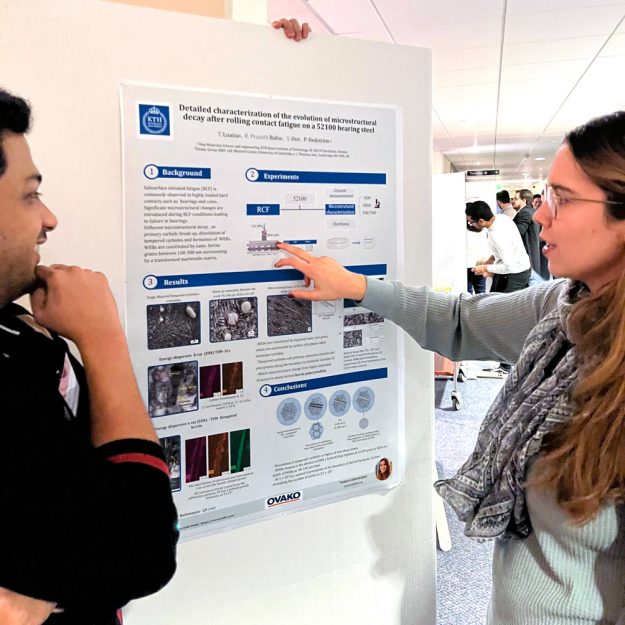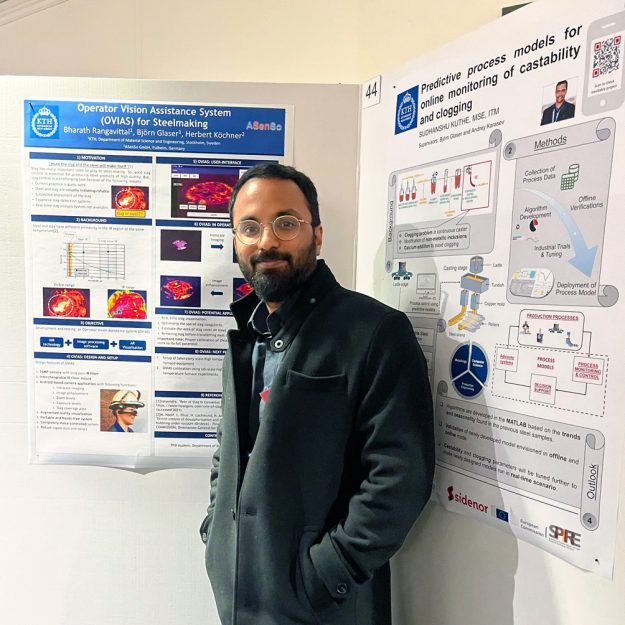Foto på ITM:s programansvariga doktorander (PAD:ar): Mohammad Abuasbeh, Sudhanshu Kuthe, Amelie Bennich, Daniel Berlin, Niloufar Salehi och Monica Katherine Gonzalez Bassante.
In English further down.
Engagerade doktorander på konferens
Den 24-25 november genomförde vi ITM-skolans doktorandkonferens för första gången på drygt två år. 39 entusiastiska och diskussionslystna doktorander deltog och många inslag kretsade kring skrivande, författarskap och etik. Ett stort tack till Ulf Sandström (Indek) och Anders Wändahl (KTH Bibliotek) för värdefull information om författarskap respektive journalval. Det var uppenbart att kunskapen om Vancouverprotokollet och andra riktlinjer för författarskap fortfarande inte är tillräckligt spridd på KTH. Och även om det inte finns ett allmängiltigt rättvist sätt att hantera författarskap så är det tydligt att vi behöver diskutera de olika normer och praktiker som finns.

Ett annat område som tarvar mer uppmärksamhet är journalval, och då i synnerhet hur vi undviker rovtidskrifter (predatory journals). Vissa journaler som vi på KTH publicerar ganska mycket i , t. ex. ”Sustainability” klassas nu som möjlig rovjournal enligt den officiella norska journalklassificeringen. Uppenbarligen behöver vi ta tag i dessa diskussioner, i vår forskarutbildning och på bred front.
Ett annat inslag som gjorde stort intryck var Josefin Sundins (SLU) personliga och omskakande berättelse om visselblåsning och vetenskaplig ohederlighet. Det stod klart för oss alla att vetenskaplig ohederlighet är ett betydligt mer utbrett fenomen än vad vi anat och att de mekanismer för att hantera denna typ av fusk på svenska lärosäten inte alltid fungerat. Ett ljus i mörkret är inrättandet av en oberoende nämnd för prövning av oredlighet i forskning. Den kommer förhoppningsvis göra det lättare att tvätta denna byk på ett neutralt och transparent sätt, till skillnad från att tysta ned problem på lärosäten för skydda deras rykte.
Även Hatef Madanis (Energiteknik) energiska och entusiasmerande inlägg om forskningens påverkan utanför akademin, impact, var högst uppskattat och underströk tydligt vikten av att vi redan i ett tidigt skede beaktar effekterna av vår forskning och lägger kraft på att kommunicera hur den påverkar olika avnämare och samhället i stort.
Det var också glädjande att våra programansvariga doktorander (PAD:ar) var väl representerade på konferensen och aktivt bidrog med information om såväl studentkårens arbete som doktoranders ansvar och skyldigheter. Mohammad Abuasbeh (Ordförande för ITM PhD Student Council) presenterade också resultaten från ITM:s doktorandenkät. Som FA är jag väldigt tacksam för denna insats då resultaten är till stor hjälp för att identifiera och prioritera förbättringsområden för vår forskarutbildning. Resultaten är inte på något sätt alarmerande och går i linje med tidigare genomförda enkäter. Men vi måste fortsätta förbättra och utveckla handledarkompetens, öka kursutbudet och tillse att doktorandernas arbetssituation i alla avseenden är hållbar.

Jag vill avslutningsvis också lyfta fram doktorandernas forskningspresentationer som en av konferensens absoluta höjdpunkter. Kvaliteten på utställda posters var mycket god men det som främst gjorde intryck var doktorandernas nyfikenhet på forskningen från andra institutioner. Förhoppningsvis kan denna typ av utbyten inte bara bredda vår kunskap utan också leda till nya kontakter och i förlängningen även nya gränsöverskridande forskningssamarbeten.
/ Mats Magnusson, Forskarutbildningsansvarig på ITM-skolan
Enthusiastic PhDs on conference
On November 24-25, we arranged the ITM school’s PhD conference for the first time in over two years. Thirty-nine enthusiastic and discussion-seeking doctoral students participated, and writing, authorship and ethics were common themes. A big thanks to Ulf Sandström (INDEK) and Anders Wändahl (KTH Library) for valuable information about authorship and journal selection. Obviously, knowledge about the Vancouver Protocol and other guidelines for authorship is still not sufficiently widespread at KTH. And even if there is no universal, fair way of dealing with authorship, it is clear that we need to discuss the various norms and practices that exist.

Another area that needs more attention is journal selection, particularly how we avoid predatory journals. According to the official Norwegian journal classification, some journals that KTH researchers publish quite a lot in, e.g. “Sustainability”, are now classified as a possible predator journal. We need to address these discussions in our doctoral education and other contexts.
Another feature that made a great impression was Josefin Sundin’s (SLU) personal and shocking story about whistleblowing and scientific dishonesty. It was clear to all of us that scientific dishonesty is much more widespread than we imagined and that the mechanisms for dealing with this type of cheating at Swedish universities did not always work correctly. A light in this dark is the establishment of an independent committee for the examination of misconduct in research. Hopefully, it will enable to clean up the mess in a neutral and transparent way and counteract universities who try to hide problems to protect their reputation.
Hatef Madani’s (Energy Technology) energetic and enthusiastic presentation about impact was also highly appreciated. He emphasized the importance of considering the effects of our research and communicating how it affects different stakeholders and society at large – already at an early stage in the research.

It was also gratifying that our programme responsible students (PADs) were well represented at the conference and actively contributed with information about the student union’s work and the doctoral students’ responsibilities and obligations. Mohammad Abuasbeh (Chairperson of the ITM PhD Student Council) also presented results from a recent survey among ITM’s doctoral students. As an FA, I am grateful for this effort as the results are very helpful in identifying and prioritizing areas for improvement for our doctoral education. The results were in no way alarming and are in line with previous surveys. Still, we need to keep improving and developing the supervisor competence, increase the range of courses and ensure that doctoral students’ work situation is sustainable in all aspects.
In conclusion, I would like to highlight the doctoral students’ research presentations as one of the conference’s absolute highlights. The quality of exhibited posters was excellent, but what mainly impressed me was the doctoral students’ curiosity about research from other departments. Hopefully, this type of exchange can broaden our knowledge and lead to new contacts and, in the long run, new cross-sector research collaborations.
/ Mats Magnusson, Director of Third-Cycle Education at the ITM School

No comments yet. Be the first to comment!